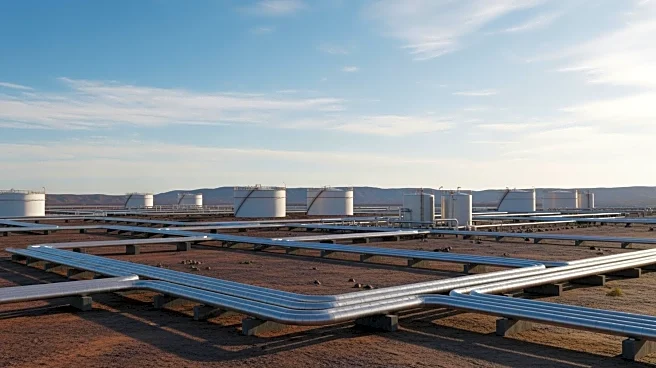What's Happening?
A recent report from Deloitte, titled 'Africa Oil & Gas Outlook 2025', reveals that Africa's oil and gas sector is losing billions in potential revenue due to significant infrastructure gaps. The report identifies
the lack of pipelines, refineries, storage facilities, and transport networks as major obstacles to monetizing Africa's abundant oil and gas resources. Countries like Nigeria and Angola face widespread infrastructure challenges that increase costs and extend project timelines. Deloitte's researchers pinpoint five main challenges: constrained access to funding, persistent cost premiums, security threats, limited regulatory collaboration, and insufficient infrastructure. The report emphasizes that access to capital is a critical pressure point for independent producers, exacerbated by ESG pressures and divestment from fossil fuels.
Why It's Important?
The infrastructure deficiencies highlighted in the Deloitte report have significant implications for Africa's ability to capitalize on its hydrocarbon resources. Without addressing these gaps, the continent risks missing out on the benefits of rising global demand for oil and gas. The report suggests that coordinated investment in midstream and downstream infrastructure is essential for unlocking Africa's full potential. This is crucial not only for economic growth but also for energy security and development. The challenges faced by African independents, such as tightening margins and investor hesitancy, underscore the need for regulatory reforms and fiscal transparency to attract investment and foster sustainable growth.
What's Next?
To address these challenges, the report calls for governments to deepen regulatory reforms and promote fiscal transparency. Aligning investment incentives with global standards and building regional partnerships to share infrastructure are recommended steps. These measures could mitigate security threats and improve the overall investment climate. The report concludes that prioritizing long-term infrastructure development alongside exploration and production is vital for Africa to fully realize its oil and gas potential. Stakeholders, including governments and investors, are urged to collaborate on infrastructure projects to ensure sustainable development and economic prosperity.
Beyond the Headlines
The report's findings highlight the broader implications of infrastructure gaps on Africa's socio-economic development. The lack of investment in critical infrastructure not only affects the oil and gas sector but also impacts job creation, energy access, and regional stability. Addressing these issues requires a holistic approach that considers environmental, social, and governance factors. The push for cleaner energy and global political shifts further complicate the landscape, necessitating adaptive strategies that balance economic growth with sustainability.










